The Dreadful Joker: Folie à Deux is a Comic Book Musical Sequel That's Ashamed to be a Comic Book Movie, Musical and Sequel
It's like the godawful first one, but with music!
In Elaine May’s Ishtar, an agent played by Jack Weston gives Dustin Hoffman and Warren Beatty’s adorably incompetent singer-songwriters sound advice.
“I'll tell you what I told Tony Bennett. Sing songs people already know. That way, they'll still have something to applaud,” he counsels the clueless amateurs.
I thought about those lines a lot while suffering through Joker: Folie à Deux, a miserable musical starring Tony Bennett’s duet partner Lady Gaga, as the badass heroine whose relationship with Joker is the envy of people who do not understand relationships, comic books, or life.
To give the film credit, I did not despise it with the furious intensity and white-hot passion with which I loathed its predecessor.
I hated Joker so much that Joaquin Phoenix went from being my favorite actor to someone whose Oscar-winning performance I flat-out detested.
Joker: Folie à Deux is an excruciatingly unnecessary sequel that punishes its audience for willing it into existence with their inexplicable fondness for the 2019 abomination.
In the production numbers that don’t come close to justifying a sequel that’s even more arbitrary than most, Joaquin Phoenix and Lady Gaga sing songs I already know. Of course, I did not applaud, but watching the stars sing and dance provided a temporary, very welcome respite from the unrelenting misery of the rest of the movie.
Joker: Folie à Deux opens with a Looney Tunes-style cartoon featuring the Joker and a literal shadow representing the creeping darkness within. It’s an audacious idea ruined by abysmal execution. That’s equally true of Phillips’ decision to make the sequel into a musical.
We then segue to live-action, and the film’s conception of the real world, which is like ours if nothing good had ever happened in the history of the universe and life on earth for everyone was just a gloomy grey migraine from the Big Bang to the bitter end.
Phoenix’s Arthur Fleck is gaunt, grim, and hopeless as he goes through the motions at Arkham Asylum, where he is being held after committing a series of very public murders two years earlier.
Joker: Folie à Deux simultaneously seems to hate its glowering black hole of a protagonist and holds him in bizarrely high esteem. That fits the movie’s incoherent conception of the character as a depressed, hopeless nobody with nothing to offer the world and a folk hero whose ostensible charisma and rebellious spirit have inspired a devoted cult of true believers who see him not as a villain or a criminal but as a revolutionary figure fighting corrupt authority.
Even in a world where the Joker, in myriad forms, has become a cult figure and the most popular supervillain in comic book history, the populist appeal of Phoenix’s mealy-mouthed creep is impossible to believe or understand.
In Joker: Folie à Deux, Arthur Fleck is famous and infamous. The movie’s observations about the corrosive nature of fame are just as banal and superficial as those of its predecessor.
Arthur’s tragic existence as the saddest man in the saddest movie ever changes for the better when he meets Harleen “Lee” Quinzel (Lady Gaga). The charismatic blonde with the melancholy aura is already a Joker super-fan when she meets Arthur.
She’s attracted not to Arthur Fleck, the pathetic loser, but The Joker, who is exactly like Arthur Fleck but dressed like a clown and much more aggressively unpleasant. Joker: Folie à Deux presents Joker and Harley as a newfangled Mickey and Mallory Knox, but the eccentric shrink with a penchant for lying and fantasy does not love Arthur for who he really is, as there is nothing to love.
Like the 2019 surprise blockbuster, Joker: Folie à Deux is worthless and destructive in many ways but its tasteless, tone-deaf and wildly insensitive depiction of mental illness might be its greatest crime, creative and otherwise.
Phoenix understands despair. That’s evident by his performances in movies like The Master and I’m Still There but he performs a grotesque parody of depression here. It’s a one-note depiction of a man who is in unbearable pain even at his happiest.
When Arthur meets Harley, his grey world turns Technicolor, and he breaks into song regularly to express the intensity of his emotions.
Arthur squares off against Assistant District Attorney Harvey Dent. Dent is played by Harry Lawtey, who appears to be twelve years old and delivers a performance so wooden it stands out in a movie where even great actors give bad performances. The exception is Lady Gaga, who isn’t bad but also can’t mask that the movie doesn’t really have a vision for the character. They’ve got more of a concept of a plan.
Joker: Folie à Deux is a comic book movie that is ashamed to be a comic book movie. It’s also a musical that’s ashamed to be a musical. Finally, it is a sequel that is ashamed to be a sequel because it knows just as much as we do that the only reason it exists is because the first one made a billion fucking dollars.
Phillips does not seem to understand the standards Lady Gaga handles with aplomb. My favorite rendition of my favorite song is Ella Fitzgerald’s version of “Bewitched, Bothered and Bewildered,” so I was initially impressed and then horrified to see it mangled by Phoenix in a context where its lyrics make no sense.
Joker: Folie à Deux cannibalizes the original shamelessly. Did you enjoy the iconically awkward/awful/meme-friendly scene where Robert De Niro’s talk show host confronts the Joker, and then is murdered? Then you’ll hopefully be able to tolerate a glib reprise with Steve Coogan taking De Niro’s place but an identical dynamic.
Phillips’ worthless sequel is full of flashbacks to the first film that highlight and underline its perverse pointlessness.
This feels like the work of a director who doesn’t believe in what he’s doing but is going through the motions for the sake of an insane payday.
This is how I imagine the talks between Warner Brothers and Todd Phillips went.
Warner Brothers Executive: Joker made a billion bucks and was nominated for eleven Academy Awards. It’s sequel time, baby!
Todd Phillips: I don’t know. It’s bad enough that I, the auteur behind Road Trip and The Hangover III, was reduced to making a motion picture about something as distasteful as a comic book clown. But because I am so talented and serious, I made an important, timeless piece of art about a weirdo who dresses up like a clown and does crimes.
Warner Brothers Executive: Yeah, but you can’t make comedies anymore because of “Woke.” The only place where comedy is not banned is Twitter and The Babylon Bee. Have you seen Elon Musk’s feed? That dude is hilarious. He’s the richest, coolest, AND funniest man on the planet.
Todd Phillips: God, you’re right. The thought police have gone too far. A movie like Blazing Saddles could never get made in today’s politically correct environment. If Mel Brooks were still alive, he’d probably be making dour superhero movies that make a perverse point of being no fun whatsoever instead of breaking the law by making a broad comedy.
Warner Brothers: That is an excellent and original observation. You pretty much can only make Joker movies at this point. Now we will fill a mansion full of hundred dollar bills if you come back. Now, at the end of Joker, the lead character goes to jail. Use that big, beautiful brain and tell me what happens next.
Todd Phillips: Uh, I guess he’s in prison, so it’s like a prison movie or something?
Warner Brothers: Oh my God. That is so brilliant. That’s why you get paid the big bucks. What then?
Todd Phillips: Uh, I guess he’d go on trial? So it’d be like a legal thriller or whatever?
Warner Brothers: That is literally the most amazing and original idea I’ve ever heard. You’re on fire! Keep going, King!
Todd Phillips: And I guess because it’s the Joker, we could introduce Harley Quinn as his love interest/partner in crime?
Warner Brothers Executive: I am literally ejaculating in my pants I am so excited about your ideas for this deeply personal labor of love.
Todd Phillips: It could also be a musical!
Warner Brothers Executive: Whatever.
I haven’t seen a sequel this spectacularly pointless and mercenary since 1949’s Jolson Rides Again. The fawning biopic The Jolson Story was so successful at the box office that three years later, they cranked out an equally successful sequel.
Alas, The Jolson Story covered everything and manufactured a bunch of nonsense in classic biopic fashion. So the filmmakers were reduced to making the third act largely about the making of The Jolson Story.
Joker: Folie à Deux similarly offers more of the same. It’s leftovers served ice cold. Joker: Folie à Deux doesn’t understand its characters or its world. Late in the film, for example, Arthur/The Joker begins doing an eccentric Southern Lawyer routine that’s unlikely anything he’s done in either film and feels decidedly off-brand. Arthur isn’t supposed to be funny. He’s supposed to be sad. But Arthur isn’t just not funny here. He’s anti-funny. He’s so miserable that he creates the opposite of laughter and mirth.
When Joker: Folie à Deux’s trailer dropped, it got a lot of acclaim from people who professed to hate Joker but saw promise in a bonkers musical sequel that would hopefully take the franchise in a strikingly different direction.
There’s a good reason the trailer got raves, and the film got pans. Every striking moment in the film, including much of Lady Gaga’s performance, is included in the trailer. Joker: Folie à Deux has two minutes of gorgeous compositions and vivid iconography. Unfortunately, the film itself runs an endless two hours and eighteen minutes.
Gosh. It’s almost as if this movie did not need to be made.
One Star Out of Five (for the songs I already know)

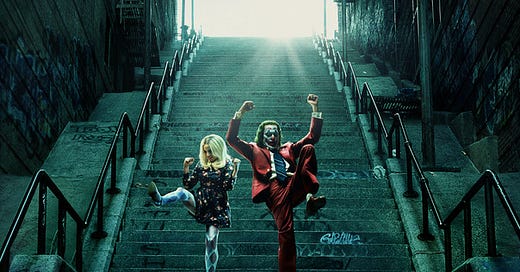




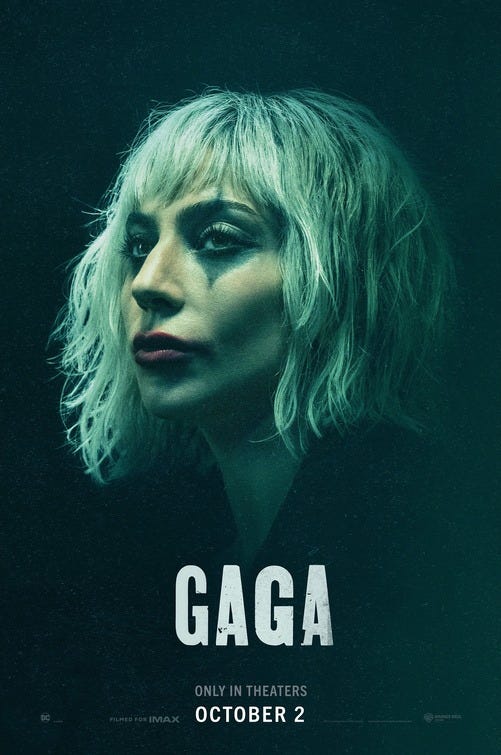
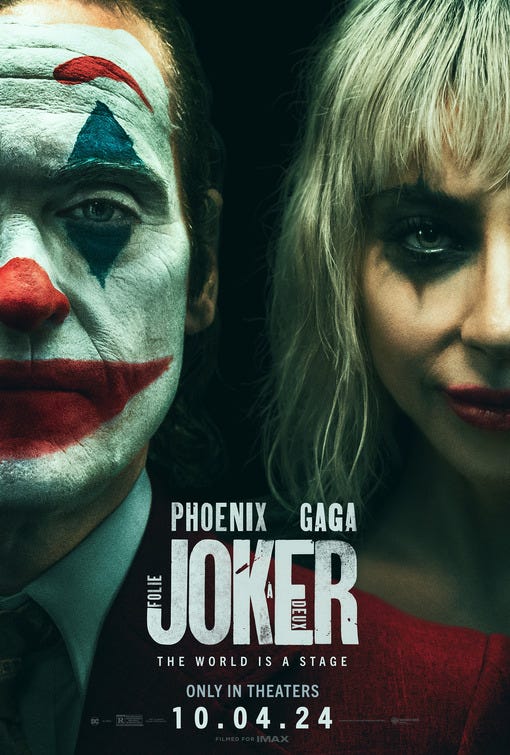
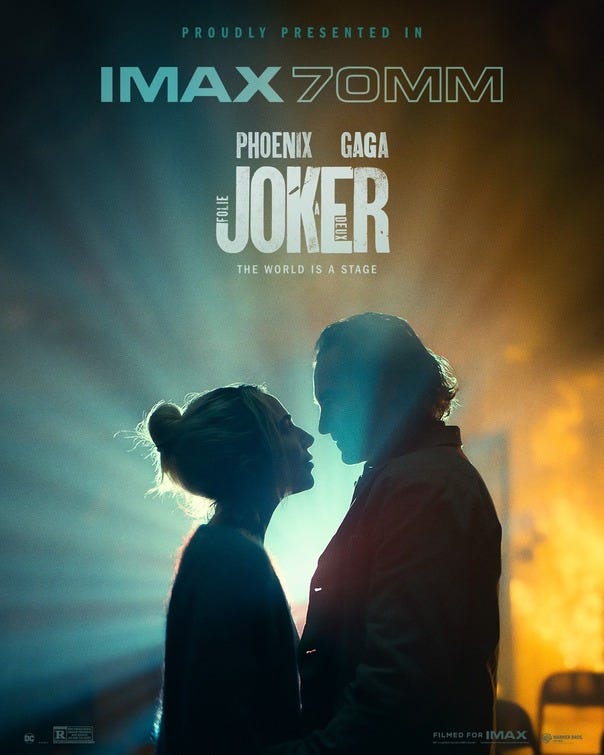
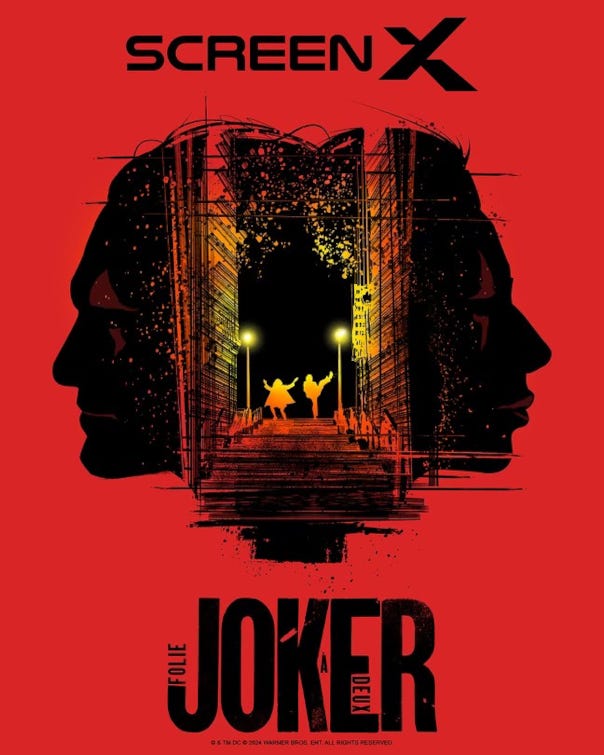
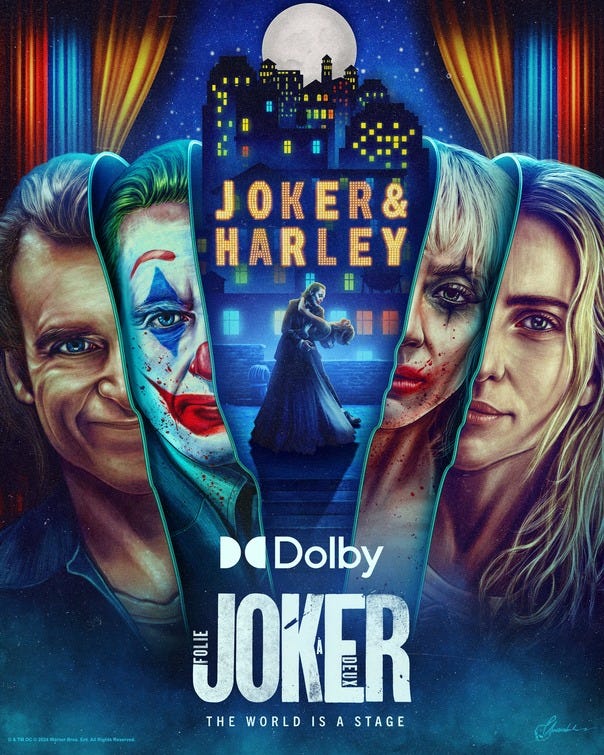
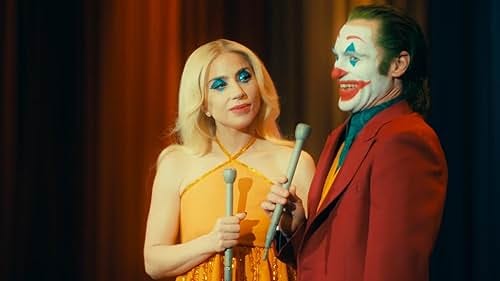
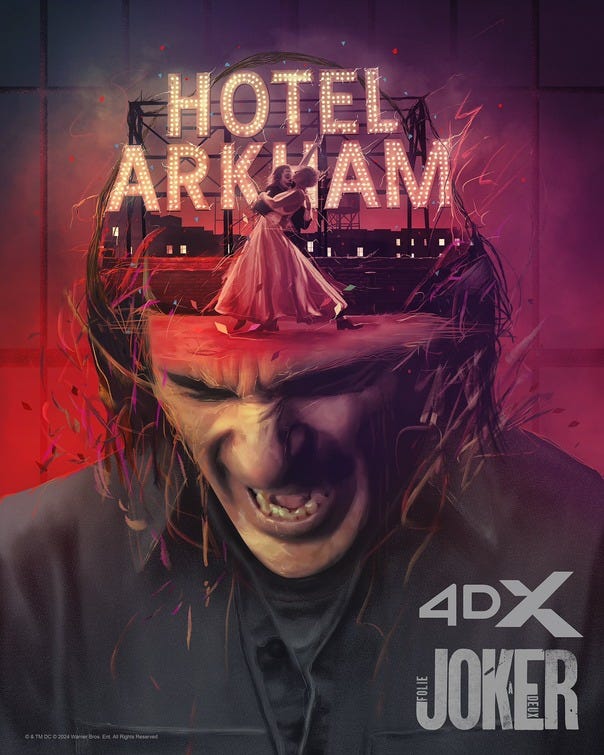
"I made an important, timeless piece of art about a weirdo who dresses up like a clown and does crimes. "
I agree!
Wait, you're talking about Hated: GG Allin and the Murder Junkies, right?
This is Ebert-reviewing-North level of hatred and I love it.